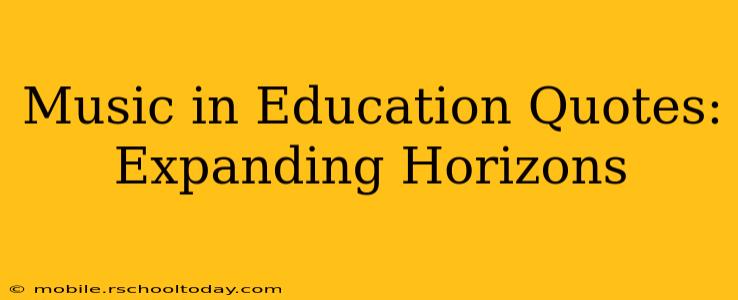Music education is more than just learning to play an instrument; it's a holistic experience that nurtures creativity, discipline, and cognitive development. Throughout history, prominent figures have eloquently articulated the transformative power of music in education. This article explores impactful quotes on the subject, delving into their meaning and relevance in today's educational landscape. We'll also address some frequently asked questions about the role of music in schools.
Why is Music Important in Education?
Many believe that music education is crucial for the overall development of a child. It's not just about producing professional musicians; it's about cultivating essential life skills. The benefits extend far beyond the musical realm, impacting cognitive functions, emotional intelligence, and social interaction. This is best summarized by the quote: "Music is the universal language of mankind." While the originator is often debated, the sentiment itself highlights the unifying and enriching nature of music.
What are the Benefits of Music Education?
The advantages of incorporating music into education are multifaceted. It enhances:
-
Cognitive Development: Studies have shown a strong correlation between music training and improved cognitive skills, including memory, problem-solving, and critical thinking. Music engages various parts of the brain simultaneously, fostering neural connections and boosting cognitive flexibility.
-
Emotional Intelligence: Music allows students to express themselves emotionally, learn to manage their feelings, and develop empathy. The act of creating or interpreting music taps into emotional depths, fostering self-awareness and emotional regulation.
-
Social Skills: Participation in ensembles and group performances nurtures teamwork, collaboration, and communication skills. Students learn to work together, respect different perspectives, and contribute to a shared artistic goal.
What are the Different Types of Music Education?
Music education takes many forms, catering to diverse learning styles and interests. These can include:
-
Instrumental Instruction: Learning to play an instrument, whether it's the piano, violin, or drums, develops fine motor skills, discipline, and a deep understanding of musical structure.
-
Vocal Training: Singing lessons enhance breath control, vocal technique, and musical expression. Chorus participation fosters teamwork and performance skills.
-
Music Theory: Understanding music theory provides a framework for analyzing, composing, and appreciating music. It helps students grasp the underlying principles of harmony, rhythm, and melody.
-
Music History and Appreciation: Learning about different musical genres, composers, and historical periods broadens cultural awareness and appreciation for the arts.
How Does Music Affect the Brain?
Music's impact on the brain is a fascinating area of ongoing research. It has been shown to:
-
Improve Memory: Learning and playing music strengthens memory functions, aiding in the retention of information across various subjects.
-
Enhance Problem-Solving Skills: The cognitive demands of music training, like reading sheet music and coordinating motor skills, translate to enhanced problem-solving abilities.
-
Boost Creativity: Music encourages creative expression and improvisation, fostering innovation and imaginative thinking.
How Can I Incorporate Music into My Child's Education?
Parents can play a significant role in supplementing their children's music education. This can be done by:
-
Listening to diverse music genres together: Exposing children to different musical styles expands their appreciation for the arts.
-
Encouraging participation in music classes or ensembles: School music programs and community music organizations provide valuable learning experiences.
-
Providing access to musical instruments: Even simple instruments like a recorder or xylophone can spark a child's musical interest.
-
Attending concerts and musical performances: Live musical experiences enrich understanding and appreciation of music.
What are Some Famous Quotes About Music Education?
Beyond the commonly cited "Music is the universal language," several other impactful quotes emphasize the value of music education. While attributing these precisely is often difficult due to variations in sourcing, the core message remains consistent and powerful. Many resonate with the idea that music fosters creativity, discipline, and a deeper understanding of oneself and the world.
Conclusion
Music education is an invaluable component of a well-rounded education. It cultivates essential life skills, strengthens cognitive abilities, and fosters emotional growth. By embracing the transformative power of music, we empower students to reach their full potential, both musically and intellectually. The numerous quotes celebrating music's role in education serve as a testament to its enduring significance.
